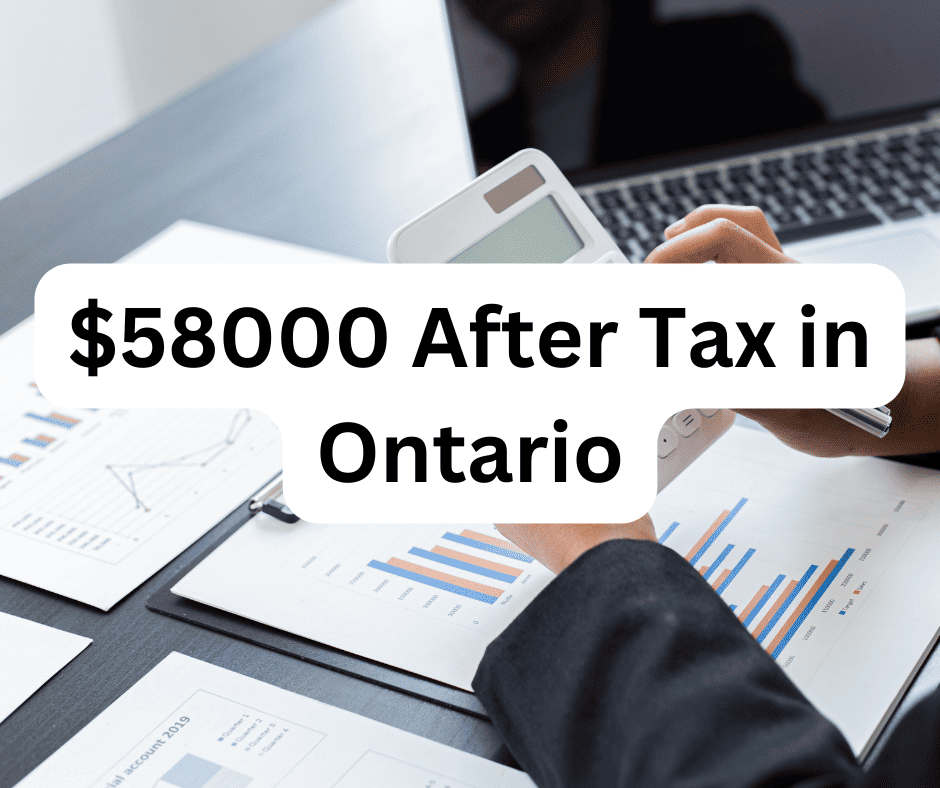Tax Rates on a $58,000 Salary in Ontario
The tax rates in Ontario on a $58,000 salary are as follows:
- Federal tax rate: 15% on the first $53,359 of taxable income
- Provincial tax rate: 9.15% on taxable income from $49,231 to $98,462
The combined federal and provincial marginal tax rate is 24.15% and the average tax rate is around 16.35% of total income. This means that total income taxes paid on a $58,000 salary in Ontario would be approximately $13,503, resulting in a net take-home pay of $44,497 annually or $3,708 per month.
Deductions on a $58,000 Salary
The main deductions from a $58,000 gross salary in Ontario are:
- Federal tax: $7,175
- Provincial tax: $3,282
- Canada Pension Plan (CPP): $2,765
- Employment Insurance (EI) premiums: $822
In total, deductions of around $14,043 would be withheld from a $58,000 salary, leaving the above mentioned take-home pay of $44,497.
Comparison to Other Provinces
Compared to other provinces, Ontario has a middle-of-the-pack tax rate on a $58,000 salary. The combined federal and provincial marginal rate of 24.15% places Ontario 6th highest amongst the provinces.
The highest combined marginal rate is in Nova Scotia at 29.8% and the lowest is in Nunavut at 20.3%. This means someone earning $58,000 would take home $3,317 more by living in Nunavut compared to Ontario.
Some key comparisons:
- Alberta: Combined marginal rate of 23.65%, take-home pay higher by $685
- Quebec: Combined marginal rate of 44%, take-home pay lower by $4,366
- B.C.: Combined marginal rate of 23.5%, take-home pay higher by $123
So Ontario is certainly not the most tax advantageous province for a $58,000 salary but is around average and better than some eastern provinces.
Is $58,000 a Good Salary in Ontario?
Whether $58,000 represents a good salary in Ontario depends greatly on individual circumstances. But in general, $58,000 would be considered a decent middle-class income, particularly for a single individual.
Some key considerations:
- The median household income in Ontario in 2020 was $79,500, so $58,000 is below the household average but reasonable for an individual.
- The average annual expenditure for a single person in Ontario is around $33,000. So $58,000 provides a decent amount of disposable income.
- The average rent for a 1-bedroom apartment in Toronto is $2,300. At a take-home pay of $3,708 per month, housing costs would be quite affordable.
In high-cost areas like Toronto or Ottawa, $58,000 provides a moderate standard of living. In lower-cost regions, it goes much further. Overall, while not a high income, $58,000 represents a solid salary to live comfortably in Ontario for most individuals and couples without children.
Conclusion
In summary, a $58,000 annual salary in Ontario results in around $44,497 in take-home pay after federal and provincial taxes. Tax rates are comparable to other large provinces like B.C. and Alberta.
While not a high income, $58,000 represents a decent middle-class salary in Ontario that allows a single person or childless couple to live comfortably in most cities, with the exception of Toronto where housing costs are high. It provides disposable income similar to the average annual spending needs.
So while $58,000 is not going to lead to lavish vacations or early retirement, it provides a solid standard of living in Canada's most populous province. With careful budgeting, most individuals and families can live well on this modest middle-income salary.

